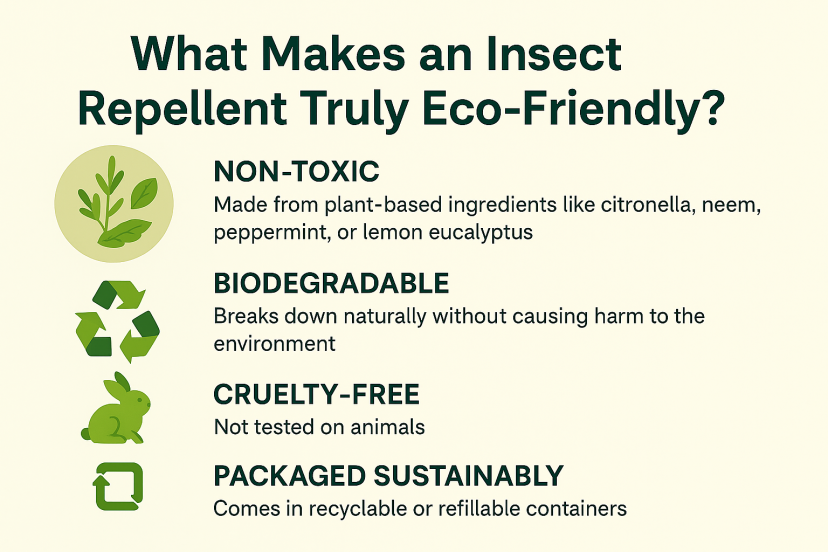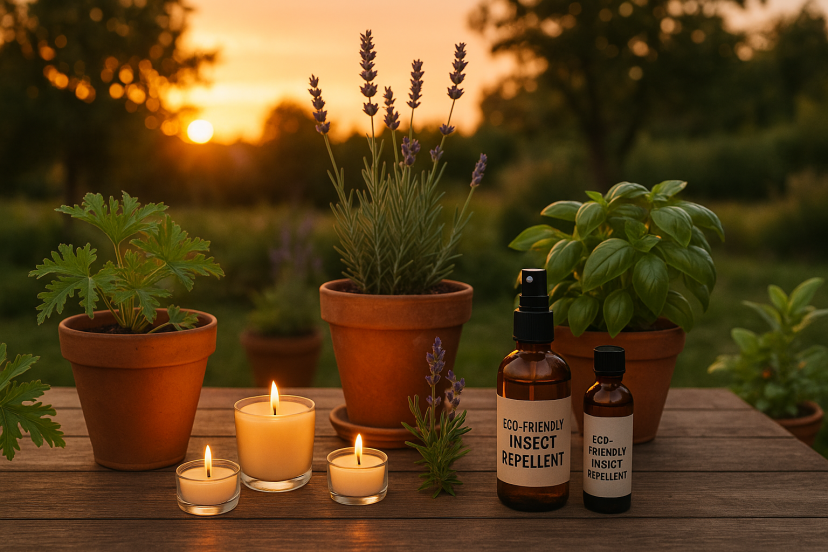10 Eco-Friendly Insect Repellents and Pest Control
We may earn a commission for purchases made using our links. Please see our disclosure to learn more.
Bugs can ruin even the calmest evening. You reach for a spray, but then wonder—what’s really in it? Traditional repellents often contain harsh chemicals that can irritate your skin and harm the environment. That’s why more people are turning to eco-friendly insect repellents. These natural solutions use plant-based ingredients like citronella, neem, and peppermint to keep mosquitoes, flies, and ants away—without toxic residues. In this guide, you’ll discover how eco-friendly repellents work, what makes them effective, and which products offer real protection. It’s your simple, sustainable way to enjoy pest-free living that’s safe for you, your family, and the planet.
The Hidden Dangers of Conventional Pest Control
Traditional insect repellents often rely on DEET, a synthetic chemical that, while effective, can irritate skin, harm aquatic life, and even linger in waterways. Aerosol sprays release volatile organic compounds (VOCs), contributing to indoor air pollution. Over time, these products can build up in your environment, affecting beneficial insects like bees and butterflies.
Switching to natural solutions helps reduce your carbon footprint while creating a safer space for everyone—including the bugs that help your garden thrive. If you’re already exploring low-waste habits, check out this guide to living a zero-waste lifestyle for even more sustainable swaps.
What Makes an Insect Repellent Truly Eco-Friendly?
Not all “natural” labels tell the full story. Genuinely eco-friendly insect repellents are:
- Non-toxic: Made from plant-based ingredients like citronella, neem, peppermint, or lemon eucalyptus.
- Biodegradable: Decomposes safely over time without leaving harmful residues in the environment.
- Cruelty-free: Not tested on animals.
- Packaged sustainably: Comes in recyclable or refillable containers.
Look for certifications such as EPA Safer Choice, USDA Organic, or EcoCert, which indicate safety and environmental responsibility. These products don’t just repel pests—they align with your eco-values.

5 Natural Ingredients That Repel Insects Effectively
1. Neem Oil
Extracted from the seeds of the neem tree, this oil disrupts insect life cycles while being harmless to humans and pets. It’s often used in gardens to deter aphids, whiteflies, and beetles.
2. Citronella
Famous for its lemony scent, citronella masks the odors that attract mosquitoes. You’ll find it in candles, sprays, and lotions—perfect for outdoor use.
3. Peppermint and Lavender Oils
These essential oils not only smell refreshing but also repel spiders, flies, and mosquitoes. Add a few drops to water for a quick DIY spray.
4. Lemon Eucalyptus Oil
According to the CDC, oil of lemon eucalyptus is a proven natural mosquito repellent and one of the rare plant-derived ingredients approved by the EPA for its effectiveness.
5. Diatomaceous Earth
This fine powder, made from fossilized algae, physically dehydrates crawling insects like ants and cockroaches. Sprinkle it around entry points or garden beds for safe, chemical-free protection.

5 Eco-Friendly Insect Repellent Products to Try
Each of these eco-friendly insect repellents offers a blend of natural ingredients, long-lasting protection, and eco-conscious packaging—ideal for sustainable homes.
1. Murphy’s Naturals Lemon Eucalyptus Oil Insect Repellent Spray
A plant-based spray using oil of lemon eucalyptus—proven to repel mosquitoes for up to six hours. DEET-free, non-greasy, and packaged in recyclable aluminum.
2. Wondercide Flea, Tick, and Mosquito Spray
Made with cedarwood and lemongrass oils, this multipurpose spray is safe for kids, pets, and plants. It controls insects indoors and outdoors while leaving a pleasant scent.
3. Babyganics Natural Insect Repellent
A family-safe formula combining citronella, peppermint, and rosemary oils. Gentle on sensitive skin, making it perfect for children and infants over six months.
4. Eco Defense Organic Home Pest Control Spray
An all-purpose repellent for ants, roaches, and spiders. Formulated with clove and peppermint oils, it’s a trusted, non-toxic option for households seeking eco-safe pest control.
5. Thermacell Radius Zone Mosquito Repellent (Rechargeable)
An innovative battery-powered diffuser that creates a 15-foot mosquito-free zone. No sprays, no scent—just silent protection powered by heat-activated plant-based repellent.
Top 10 Green Pest Control Options at a Glance
| Type | Name / Ingredient | Best For | How It Works |
| Natural | Neem Oil | Gardens, plants | Disrupts insect growth & feeding |
| Natural | Citronella | Outdoor mosquito control | Masks human scent |
| Natural | Peppermint & Lavender Oils | Home & indoor areas | Repels flies, spiders, mosquitoes |
| Natural | Lemon Eucalyptus Oil | Outdoor protection | EPA-approved natural mosquito repellent |
| Natural | Diatomaceous Earth | Floors, corners, garden beds | Dehydrates crawling insects |
| Product | Murphy’s Naturals Spray | Personal use | Long-lasting, DEET-free, plant-based |
| Product | Wondercide Spray | Homes & pets | Cedarwood + lemongrass repel fleas/ticks |
| Product | Babyganics Repellent | Families & kids | Gentle formula for sensitive skin |
| Product | Eco Defense Spray | Household pests | Clove & peppermint oils target roaches/ants |
| Device | Thermacell Radius Zone | Outdoor patios | Heat-activated mosquito barrier |
DIY Eco-Friendly Pest Control Ideas
You can also make your own natural repellents using household ingredients:
- Garlic Spray: Blend garlic and water to deter ants and mosquitoes.
- Vinegar Spray: A simple solution for flies and fruit gnats.
- Chile Pepper Spray: Combine chili powder, dish soap, and water to repel garden pests.
- Soap Spray: A mix of mild soap and water works wonders against aphids.
- Vegetable Oil Spray: Smothers insects and adds shine to plant leaves.
These low-cost alternatives are easy to prepare and work surprisingly well for small-scale pest problems.
Why Natural Repellents Work
When you ask, “Do botanical sprays really keep bugs away?” the answer is yes—at least under the right conditions. Natural insect repellents work in a few fascinating ways, and science backs it up.
First, many plant-based repellents don’t actually kill insects—they confuse or mask the scents that attract them. As explained by Biode’s research on natural insect repellents, essential oils such as citronella, lemon eucalyptus, and peppermint interfere with insects’ receptors. These compounds disrupt the way mosquitoes and flies identify human scent, making it harder for them to find you in the first place. In simple terms, the oils don’t just repel—they make you “invisible” to bugs.
But there’s also strong scientific data showing that these natural oils do more than mask scents—they actively repel or deter insect behavior. In a peer-reviewed study published in the Journal of Arthropod-Borne Diseases, researchers found that Eucalyptus globulus (eucalyptus oil) at just 3% concentration achieved 97.15% repellency against Anopheles stephensi mosquitoes, and that combining it with Syzygium aromaticum (clove oil) made it even more effective.
These findings show that eco-friendly repellents can be remarkably effective when properly formulated. Their power lies in combining aromatic compounds that naturally confuse, deter, or overwhelm insect olfactory systems. Of course, their longevity and intensity depend on concentration, environment, and method of use (like sprays versus diffusers).
Eco-Friendly Pest Prevention Tips
- Eliminate standing water where mosquitoes breed.
- Close off gaps or cracks around windows and doors to prevent insects from sneaking in.
- Keep food in sealed containers and wipe down kitchen surfaces frequently to avoid attracting pests.
- Plant natural deterrents like basil, rosemary, or catnip near doors and patios.
- Attract natural predators like ladybugs to help maintain a healthy balance and control unwanted pests organically.
Prevention, when paired with natural repellents, creates an eco-safe shield against unwanted bugs.
Conclusion
Choosing eco-friendly insect repellents isn’t just about avoiding chemicals—it’s a step toward a sustainable lifestyle. These natural solutions protect your home, your health, and the environment all at once. From essential oils to rechargeable diffusers, today’s green options prove that effectiveness and eco-consciousness can go hand in hand. So, the next time pests threaten your peace, go natural—you’ll feel better knowing you’re making a difference.
FAQs
1. What’s the greenest way to manage pests responsibly?
Using natural repellents, biological controls (like ladybugs), and physical barriers such as screens or diatomaceous earth are among the most eco-friendly methods.
2. What are the most effective insect repellents?
Oil of lemon eucalyptus, citronella, and neem oil are proven to repel a variety of insects effectively without harsh chemicals.
3. What is an example of a natural insect repellent?
Citronella, derived from lemongrass, is one of the best-known natural repellents used in sprays and candles.
4. What is the most environmentally friendly pesticide?
Neem oil and diatomaceous earth are considered among the safest and most sustainable pest control options.
5. What are eco-friendly pesticides?
They are plant- or mineral-based solutions that target pests without harming people, pets, or the environment—like essential oil sprays or biological controls.




